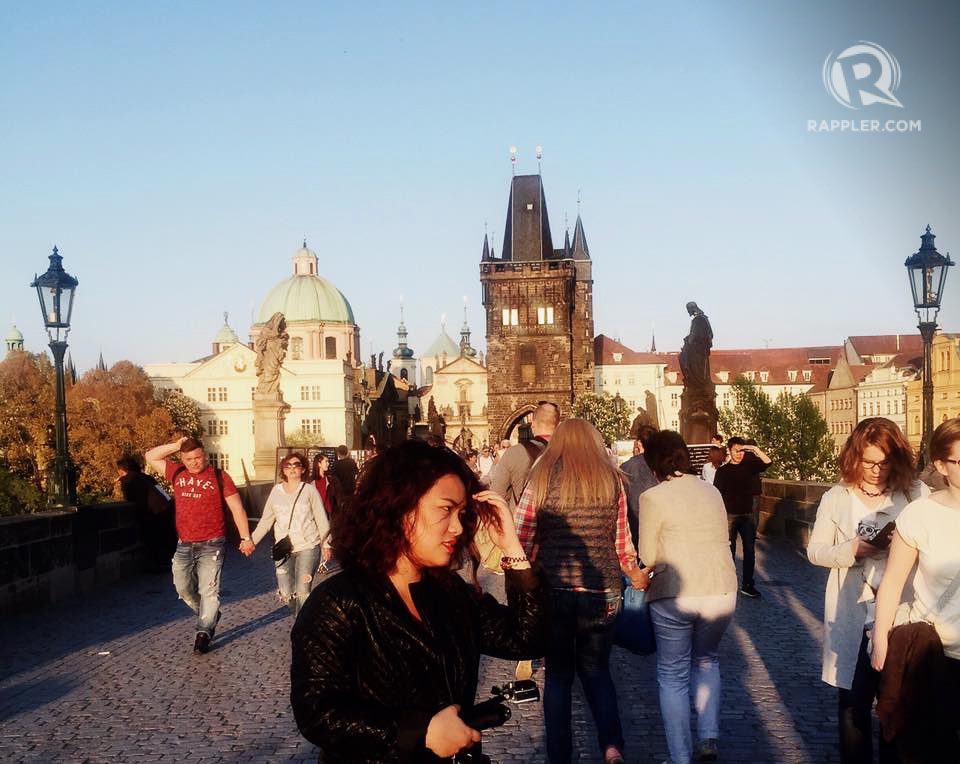SUMMARY
This is AI generated summarization, which may have errors. For context, always refer to the full article.

(UPDATED) Last year, at the age of 21, I applied for a Schengen/Europe visa, a US visa, and a Japan visa. Fortunately, all of these got approved!
In my case, the US visa was the easiest one to get and the Japan visa was the cheapest to get. The Schengen/Europe visa was the most expensive and hardest to get but it was the most worth it because with just one visa, you will be able to visit a majority of European countries, including almost everyone’s dream destinations – France, Italy, Germany, and Switzerland.
Without much thinking, I decided to make my dream of going to Europe come true. It was less than a year since I graduated from college and only 7 months into my then-job. I knew that there were a lot of red flags that would get me denied but I also knew that if I was scared forever, I’d never be able to visit my dream place. So I saved, researched, completed the requirements, went for an interview, then had the best moments of my life. Almost a year has passed but I still cannot move on! Read on if you want to know how you can make your Eurotrip dreams come true.
Check this short video I made on what countries I’ve been to on my Eurotrip!
What is a Schengen visa?
Think of it as your pass to Europe. Just having the means and money to travel does not mean that anyone can just pack and go to Europe. Unfortunately, we have to get a visa, which involves a long process.
With a Schengen Visa, you can visit the following countries: Austria, Belgium, Denmark, Estonia, Finland, France, Germany, Greece, Hungary, Iceland, Italy, Latvia, Lithuania, Luxembourg, Malta, The Netherlands, Norway, Poland, Portugal, Slovakia, Slovenia, Spain, Sweden, and Switzerland.

How can I get a Schengen visa?
1. Know why you’re going and where you’re going
There are different types of visas – for tourism, visiting relatives, for work, and a lot more. Each has different requirements and I have only experienced obtaining a tourist visa. You also need to know which places in Europe you’ll be visiting. This is important because the embassy of the country where you will stay at the longest is where you will file your visa application. But, if for example, you plan to spend days each in the Netherlands and Germany, then you have to apply at the embassy of your first destination.
2. Check the visa requirements
Each embassy has its own set of requirements. Although most of them are similar, it’s better to refer to the actual site itself. I applied at the German embassy and people say its the strictest when it comes to visa application. You need to complete the requirements and attend a face-to-face interview with a consul. Some European countries do not require an interview, such as France and Italy. If you’re filing your application at the German embassy, you can refer to this link. All of the things that you need to prepare are already there. I discourage everyone to pay for visa assistance as it costs a lot of money for something you can do yourself. You just have to read, analyze, and do some research. Forums and blogs really help.
3. Prepare and complete the requirements
Unlike applying for a US visa, applying for a Schengen visa requires you to submit documents to prove that you are rooted here. All of these requirements are non-negotiable. If you miss even one of these, your application will be denied even before you can be interviewed (yes, I witnessed this with my own eyes.) Submitting as many documents as you can to prove you will not live or work there on a tourist visa will increase your chances of approval.
Here are the requirements:
- Passport – Must be valid for the next 6 months upon application.
- Two current passport pictures – Be sure to check the required format for the photos.
- Visa application form – You can answer the form here even if you still have not completed the requirements. You can do it as early as now.
- Signed declaration – This just needs to be printed and signed.
- Original birth certificate – This must be updated. You can order it online for P350.
- Flight reservation – You do not need to buy a plane ticket yet. Flight reservation is just meant to give the consul an idea of your travel dates and the airports you’ll be arriving and departing from. I got mine from Dream Euro Trip.
- Bank statement – Embassies need to know whether you have the means to travel and not stay in their respective countries illegally. This will be backed up by a bank statement which shows all your debits and credits in the past months. The German embassy requires a bank statement from the past 3 months. This can be requested at your bank branch.
- Bank certificate – A bank certificate is a one-page document signed by the bank branch manager. Your current balance and the date you had that account will be stated there.
- Health insurance – Every Schengen country requires you to have health insurance for your travel. The German embassy needs the insurance to cover 30,000 euros. The amount of the insurance depends on your length of travel. This cost me around P6,000 from Care Concept.
- Income tax return – You can request this from your company’s HR. If you are self-employed, you can present the documents of the company accounts in case you don’t have this.
- Certificate of employment – This can be requested from your company’s HR, as well. It should indicate your position in the company, your length of employment, salary, allowance, benefits, and employment status.
- Leave of absence – This can either be from your immediate supervisor or company HR. It should indicate that they are allowing you to take a leave during the date you indicated to the embassy, and that you will still have your job when you return.
- Cover letter – One page is enough to tell the consul your plans of traveling to Europe. You can check my cover letter template here.
- Itinerary letter – Listed here would be the dates and your travel plans. You can check my itinerary letter here.

4. Reserve your interview date
The German embassy only entertains applicants 3 months before their planned departure. If you’re planning to go to Europe in September, you should reserve an interview date around June. Interview slots are booked almost immediately so book as soon as possible. Book ASAP here.
5. Prepare for your interview
Preparing for your interview includes:
- Organizing your requirements as stated on the website
- Researching the possible questions by visiting forums such as PinoyExchange
- Jotting down the activities you’d like to do and places you want to visit
- Looking for an appropriate outfit for your interview – first impression is the last impression!
- Photocopying all your requirements twice as they will get the original copy.
If you want to know how my actual interview went, click this link. I did a full transcript on the exact questions asked.
6. Wait for the result
This was the most agonizing part of the whole process. With a US visa, you’ll know right away whether you’re approved or not. It may hurt if you’re denied, but you can easily move on after that. However, with a Schengen visa, you’ll be tormented for days about the result. I applied on a Wednesday and since I had all weekend to overthink it, I went on a weekend vacation to take my mind off of it. The next Monday, I got the visa via 2Go – a total of 3 business days from the time I had my interview.
I received a multiple entry visa from the German embassy! It also added a couple of days to what I originally requested.

7. Book your flight
I booked my flight as soon as I received my visa. My go-to websites for flights are SkyScanner and CheapFlights. I took the Manila to Dusseldorf flight for P45,000. Not bad.
8. List down your must-see countries and cities
My non-negotiable countries were Germany and the Netherlands. However, mid-trip, I found out about a website that offers bus tours across all of Europe. With that, I visited 10 countries for only P80,000+. TourRadar gives you a list of places you can visit in Europe without taking flights. I booked the Europe Jewel using a promo code upon check out and it reduced the final price by P5,000. Check the tours if you don’t want to be bothered planning your Eurotrip.
9. Prepare your documents for your departure
Before you fly to your first European country, make sure that you have your photocopied passport, hotel accommodation, and travel insurance. When I crossed Germany, I was also asked how much money I had. I told the border patrol that I only have 20 euros with me. He was shocked and asked, “How can you survive with just 20 euro?!” I told him that of course I haven’t withdrawn money yet and I have my debit cards with me. He asked for it and also photocopied it for his reference.
10. Enjoy Europe!
Europe was amazing! It’s been more than a year now but I still cannot move on. The places I saw, the people I met, and the food I ate are the reasons why I’m working hard even until now. I want to go back! Yes, applying for a visa was hard but it was worth it!

FAQs
- When should I apply for a Schengen visa?
The recommended time is 3 months before your intended date of travel. In my case, I booked an interview on the 30th of January, had the interview on the first week of March, then flew to Germany by the end of March.
- How much show money do I need to present?
It depends on the number of days you’ll visit Europe and the countries you’ll go to. Please refer to this chart for the daily amount you should have.
- I have a boyfriend/friend/relative who wants to shoulder my trip. What do I need?
If someone is sponsoring your travel, you need to present the following:
- Proof of relationship with the sponsor (eg birth/marriage certificates which substantiate the kinship, relationship or friendship)
- Written correspondence between you and your sponsor, proof of telephone connections, and other evidence of the relationship between you and your sponsor
- If no formal obligation is submitted: an informal invitation by the host, which includes information on the host’s exact address of residence, the purpose of travel, and the full duration of travel and stay
- Formal Obligation (original and a Xerox copy) according to sections 66-68 of the German Residence Law, given by your host to the aliens authority (“Ausländerbehörde”) in Germany that is responsible for his/her area of residence
- What are the common questions that are asked in the interview?
- What’s your purpose in traveling?
- How long will you stay in Europe?
- How much are you making in a month?
- Have you been to other countries?
- What if my visa gets denied? What can I do?
If you applied at the German embassy, you can appeal within one month of your visa rejection. Send your appeal/remonstration letter to visa@manila.diplo.de with the subject [Remonstration for Full Name]. State in the email why you think they should reconsider your application. Attach documents if necessary. You need to sign the document so print, sign, and scan it. You can also send your letter through courier service to this address:
Embassy of the Federal Republic of Germany
Visa section
25/F Tower 2, RCBC Plaza,
6819 Ayala Avenue,
Makati City 1200
- I am xx years old, earning xx,xxx a month, I’ve traveled to xxx countries before. Will I be approved?
As much as I’d like to help assess your profile, I don’t have the authority to do so. I can only answer it based on common sense but the embassy has the final say. I believe the most important factors in order to be approved are the following:
- You have a full-time job here
- You have financial capacity to support your trip
- You never had any brushes with the immigration and law
- You have a reason to come back here (business or family)
– Rappler.com
For more travel, finance, and career assistance from Jacklynne, follow and message her on Facebook, Instagram, and YouTube.
Add a comment
How does this make you feel?
There are no comments yet. Add your comment to start the conversation.